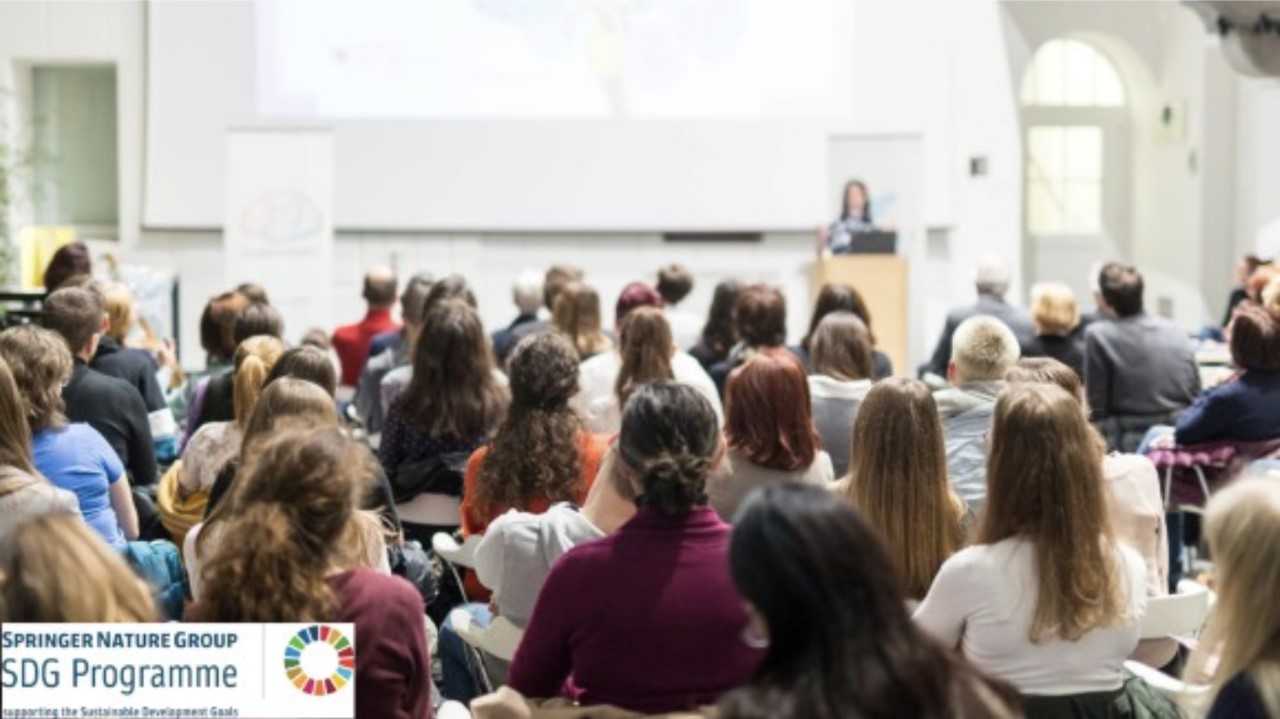News and Announcements
Contributions are welcomed from researchers, higher education professionals, and students who are passionate about fostering student engagement and community building. Share your research, best practices, or successful initiatives and join this unique opportunity to connect with peers across Europe.
Keynote Speaker:
Dr. Manja Klemenčič
Submission Deadline:
November 3rd, 2024
We look forward to your involvement!
UNICOMM is an EU co-funded initiative designed to enhance students' sense of belonging, promote community building, and encourage active engagement and participation.
To learn more, visit the project homepage at: https://wolontariat.uw.edu.pl/unicomm/.
We are looking forward to your proposals and to seeing you at the symposium!
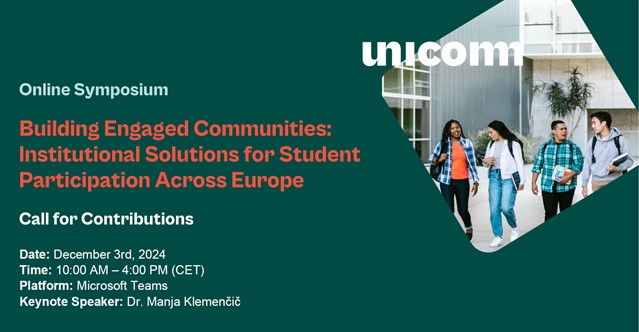
On October 30, 2024, we would like to invite you to join the CHELPS Global Webinar Series for a talk with Prof Keith D. Walker (University of Saskatchewan) and Prof Benjamin Kutsuyruba (Queen's University) sharing their insights on higher education policies and practices in addressing the challenges of mental health and human flourishing.
Drawing on the initiatives, practices, and structures that provide a positive outlook on individual and organisational flourishing in higher learning, the presenters will share key lessons from efforts to promote positive emotional and social nurturing through student resilience and leadership, supervisory relationships, appreciative mentoring, student thriving, issues of mental and physical health, faculty and leader wellbeing, development of wellbeing interventions and health promotion frameworks, and international student wellbeing.
Please register by using this Zoom link: https://eduhk.zoom.us/meeting/register/tJAudO6tpzwoG9eaKGGsVs0D_ksxjlC02Faf.
About Presenters:
Keith D. Walker is a Professor in the Department of Educational Administration at the University of Saskatchewan, Canada. He has consulted with senior educational leaders, development bank leaders, and public sector executives worldwide. For over 35 years, Professor Walker has taught educational law and professionalism, organizational theory/behaviour, policy-making, school improvement and renewal, political, ethical and jurisprudential philosophy, case-based leadership and ethics courses. Keith is currently a Provincial Cabinet-appointed member of the Saskatchewan Higher Education Quality Assurance Board.
Benjamin Kutsyuruba is a Professor of Educational Leadership, Policy, and School Law in the Faculty of Education at Queen’s University, Kingston, Ontario, Canada. Benjamin has worked as a teacher, researcher, manager, and professor in the field of education in Ukraine and Canada. His research interests include educational leadership and policymaking; teacher development, induction, and mentorship; wellbeing and flourishing; school climate and safety; trust, moral agency, and ethics, among others.
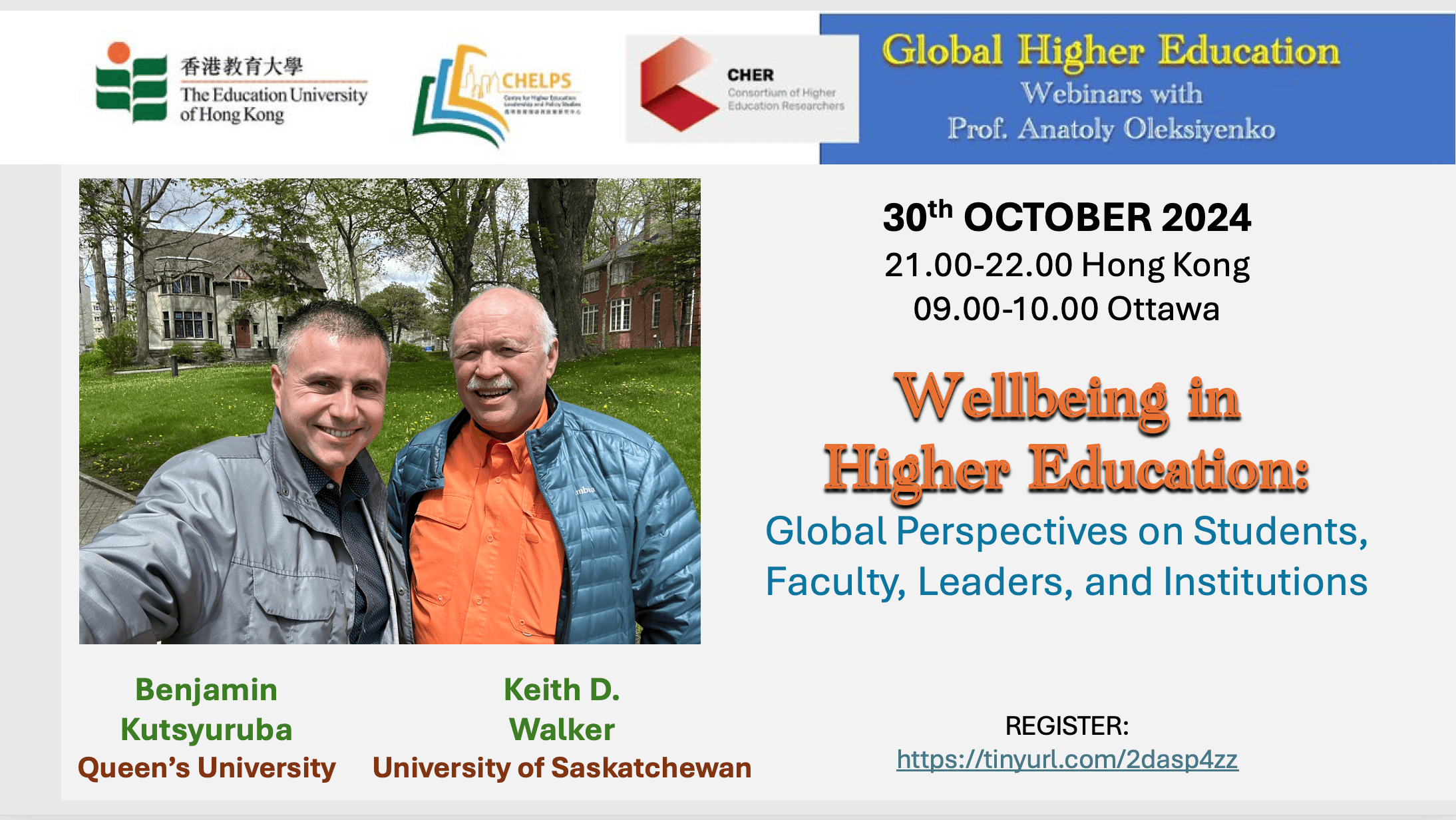
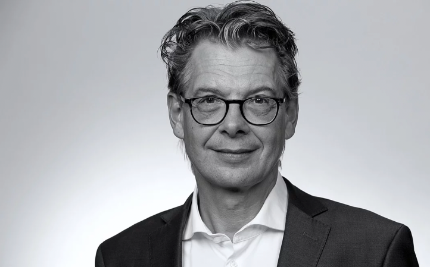
Georg Krücken contributed pioneering research in higher education, science studies, and organizational theory, shaping the academic understanding of university and science systems worldwide. He and his team at INCHER-Kassel hosted the 2019 conference of the Consortium of Higher Education Researchers (CHER), of which he was a member of the Board of Governors, generously providing advice and guidance to later convenors, even as he fell ill. Born on 21 September 1962, in Bad Honnef, Germany, he died of cancer on 7 October 2024, in Hanover, Germany, leaving an enduring legacy of scholarly excellence.
Georg’s academic journey began at Bielefeld University, where he completed his Diplom in sociology in 1989, based on studies in philosophy, political science, and sociology at Bielefeld and Bologna. He went on to earn his Dr. rer. soc. from Bielefeld in 1996 and in 2004 completed his Habilitation in sociology there. After various roles in Bielefeld, he was Professor at the German University of Administrative Sciences Speyer (Deutsche Universität für Verwaltungswissenschaften), Germany (2006—2011). In 2011, Georg was called to Kassel University, Germany, to the Chair in Higher Education Research—and to be Managing Director of the International Centre for Higher Education Research (INCHER-Kassel), a key university-based center higher education research in Europe (and the birthplace of CHER). In his leadership of INCHER-Kassel, Georg sustained this international center as a hub for innovative research, emphasizing interdisciplinary collaboration, and bringing together scholars from around the world to examine crucial issues in higher education, including governance, internationalization, and organizational transformation.
Georg’s research spanned a diverse array of topics within the discipline of sociology and the multidisciplinary field of higher education. In particular, his intellectual pursuits were rooted in the exploration and expansion of neo-institutionalism, particularly how universities and other organizations adopt global models while and economic rationality, as well as the challenges and opportunities presented by new public management reforms. His work also addresses the complexities of quality assurance and accreditation in higher education, the diffusion of scientific knowledge, and the societal implications of technological and ecological risks. These insights have significantly enhanced the understanding of how higher education institutions and organizations evolve in the face of global forces, shaping both theoretical and empirical research on the subject.
His scholarly work and influence extended globally, earning him recognition as a thought leader in both European and international academic circles. His impact extended through diverse international engagements and deep personal connections with many leading scholars of multiple generations. Research and teaching stays at Stanford University (1999-2001, 2011, 2023–24) and Sciences Po Paris (2005, 2016), countless international research collaborations, numerous memberships on editorial and other boards, in academies, and as the founder of research networks are testament to his organizational abilities and personal generosity. For decades, he was Spokersperson of the key research network on Neo-Institutionalism in the German-speaking world that he co-founded. Georg also played a significant role in institutionalizing higher education research in Germany as Chair of the Gesellschaft für Hochschulforschung (GfHf) (Society for Higher Education Research). All these roles underscore his steadfast commitment to advancing the field’s institutionalization. From 2021 to 2024, he was the Spokesperson of the DFG Research Group on “Multiple Competition in Higher Education”. Through his leadership, Krücken championed the importance of higher education research as a vital multidisciplinary field, creating lasting frameworks for future scholarship in the area. His highly-cited work provides important insights into how universities and other organizations adapt to global pressures, maintaining their distinctiveness while adopting shared models of operation.
Georg Krücken’s passing is a profound loss to all who new him, to the academic community and in particular to INCHER-Kassel and the networks he coordinated, including CHER. Yet his legacy will endure through the research he conducted and inspired, through the scholars he mentored, and the academic organizations he shaped. His work resonates, offering valuable insights into the evolving dynamics of higher education in a globalized world. His dedication and his research agenda-setting has left a lasting imprint on the field and on so many of us who counted him as colleague and friend.
We are excited to announce a call for abstracts for a proposed special issue of the International Journal of Educational Research entitled“Understanding Academic Freedom – Cross-Disciplinary and Cross-Regional Perspectives”.
In recent years, academic freedom has gained significant global attention as both autocratic regimes and rising populist movements in democratic nations have posed serious threats to it. Despite efforts from various organizations and policymakers to safeguard academic freedom, the situation has worsened globally. Although much scholarly work has been done on this topic, there remains a substantial gap in cross-regional dialogue, understanding the sources of these threats, and exploring empirical trends on a global scale.
This special issue seeks to foster a comparative and comprehensive understanding of academic freedom, with contributions from multiple disciplines and regions. We invite scholars to submit abstracts that address these concerns through diverse disciplinary lenses or offer cross-country or regional analyses.
Submission guidelines:
- Abstract length: Max. 750 words.
- Details to include: Core argument, research design (if applicable), and potential impact/contributions of the study.
- Submission deadline: 30 November 2024.
- Additional information: Please include the title of the paper, author name(s), affiliation(s), and a short bio (100 words per author).
Submissions should be emailed to the special issue editors:
- Zoltán Rónay: This email address is being protected from spambots. You need JavaScript enabled to view it.
- Marcelo Marques: This email address is being protected from spambots. You need JavaScript enabled to view it.
- Gergely Kováts: This email address is being protected from spambots. You need JavaScript enabled to view it.
- Daniela Craciun: This email address is being protected from spambots. You need JavaScript enabled to view it.
We are eager to receive a wide range of contributions, particularly those that bring innovative perspectives to the understanding of academic freedom in different contexts. Please consider sharing this call with colleagues in your networks who may be interested.
A comprehensive timeline for manuscript submission and publication will be shared in February 2025. Selected abstracts will be key to shaping the direction of this special issue.
We look forward to your contributions!
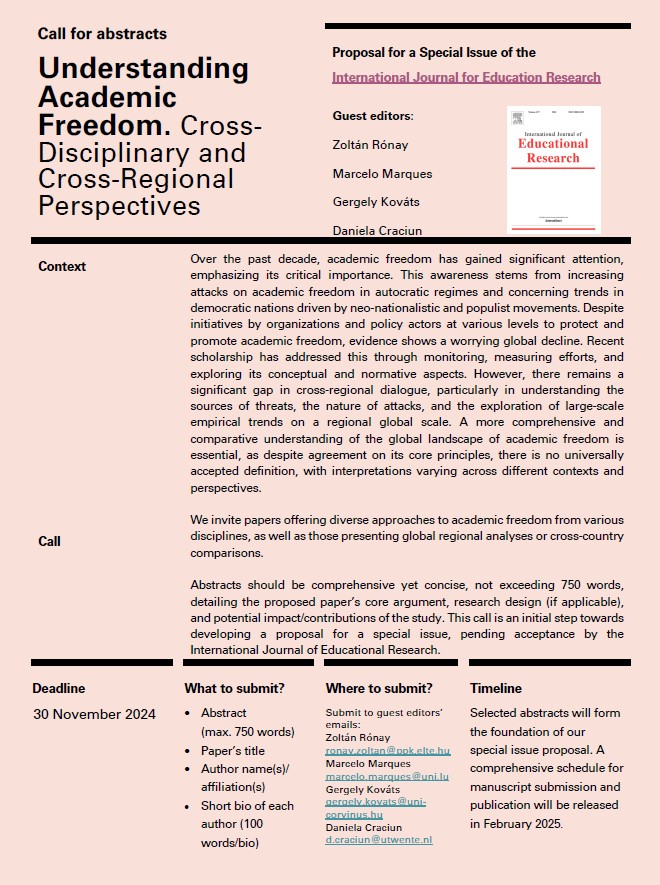
Submission Guidelines:
- Abstracts: Abstracts of up to 1,000 words (including references) are welcomed. Each submission should include a brief bio of up to 50 words for each contributing author.
- Deadline: Please submit your abstract by October 31, 2024.
- Submission Emails: Send your submissions to This email address is being protected from spambots. You need JavaScript enabled to view it., This email address is being protected from spambots. You need JavaScript enabled to view it. or This email address is being protected from spambots. You need JavaScript enabled to view it..
For any questions regarding the submission or the special issue, please feel free to contact them at the email addresses above. For additional information, please refer to: https://www.nature.com/collections/hhacgbgjbi.
